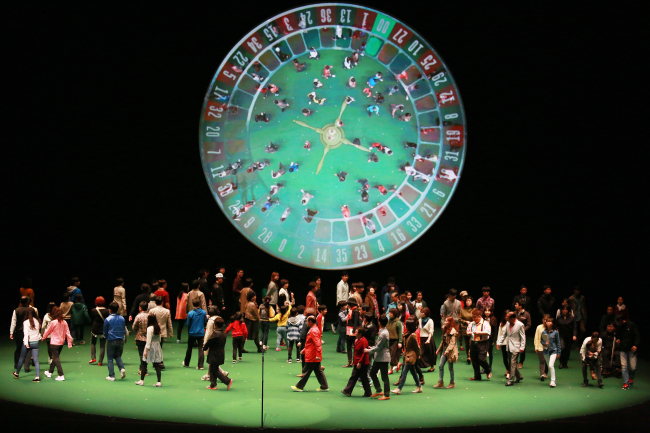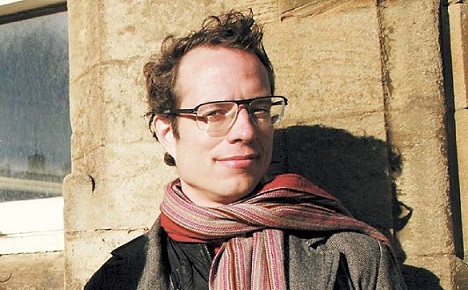Reality beyond statistics
Stefan Kaegi of Rimini Protokoll talks about ‘100% Gwangju,’ documentary theater
By Korea HeraldPublished : April 23, 2014 - 19:47

We live in a world of statistics. Statistics expressed in the form of percentages, graphs and pie charts are everywhere. Their stated aim is to paint an accurate picture of reality with numbers.
But European avant-garde theater group Rimini Protokoll challenges this notion and aims to show what the dry statistics fail to show. With its series of “100% city” shows, it has been giving faces to the numbers, by putting 100 people of a city on stage to answer questions that go beyond regular statistics.
Its first project in Korea is in Gwangju, a city of 1.4 million people still largely associated with a massacre that took place there on May 18, 1980, when the country was ruled by military regimes.
Stefan Kaegi, the director of “100% Gwangju” and one of the three members of Rimini Protokoll, sat down with The Korea Herald late Tuesday night in Seoul to talk about Gwangju, the show’s upcoming run in Seoul and his other experimental theater works.
But European avant-garde theater group Rimini Protokoll challenges this notion and aims to show what the dry statistics fail to show. With its series of “100% city” shows, it has been giving faces to the numbers, by putting 100 people of a city on stage to answer questions that go beyond regular statistics.
Its first project in Korea is in Gwangju, a city of 1.4 million people still largely associated with a massacre that took place there on May 18, 1980, when the country was ruled by military regimes.
Stefan Kaegi, the director of “100% Gwangju” and one of the three members of Rimini Protokoll, sat down with The Korea Herald late Tuesday night in Seoul to talk about Gwangju, the show’s upcoming run in Seoul and his other experimental theater works.

“At first, I was little bit worried about the audience there,” the Swiss theater director said, when asked about two “100% Gwangju” shows that were staged on April 19 and 20 in the city. He had just flown to Seoul after wrapping up the shows. “But the audience there was very interactive. Very loud. It was quite full as well,” he said.
Like other cities in the “100%” series, the “100% Gwangju” project began with the casting of one member who was then asked to recruit the next in 24 hours, with the second member picking the third member and so on.
The final 100 people were selected to show a cross section of the city, mirroring its demographic makeup: Since 51 percent of the city’s population are women, 51 of the cast were women. There had to be six over 70 years old, three divorcees and one foreign national.
The cast ― all nonactors and ranging in age from 1 to 82 ― then shared their life stories on stage and answered questions from each another, audience members or producers, creating a live interactive human opinion poll.
“The show is very democratic in itself. We have an open microphone situation where anyone from the audience can ask any question they want,” the Swiss director said.
In one episode illustrating this, during a 2013 production of “100% Tokyo” someone from the audience asked whether the mayor of Tokyo should step down. There was a graft scandal involving him at that time. An overwhelming majority of the cast answered yes.
“100% Gwangju” is the latest and the 18th variation of “100% Berlin,” held in 2008. The concept is the same, some of the questions are the same, but the show itself has evolved greatly since Berlin, Kaegi said.
“We’re artists. We don’t just repeat ourselves. Every time, we try out new things in new cities,” he said.
For the Seoul run of “100% Gwangju,” he will be changing some of the questions, by dropping those related to local issues in Gwangju, he added.
“It is the first time that we are moving the ‘100% city’ production to another city. We’re very curious to find out how the (Seoul) audience reacts to the show.”
Although it is “100% Gwangju,” people in Seoul will be able to relate to it, Kaegi believes, because it is, for the most part, about people who are living at the same time in Korea, he said.
“It is a show about Gwangju in some points. I think, after some time, the audience will forget that the people on stage are from Gwangju.”
To him, the Gwangju show seems to have revealed the existence of negative feelings in Korean society that people rarely admit publicly.
That was shown in answers not only to some obvious questions like “Have you thought about suicide?” and “Who here has felt depression?” but also to those like “Who thinks the media is manipulated?” A lot of lights were turned on, a signal for yes.
Rimini Protokoll, consisting of Kaegi and his two German colleagues Helgard Haug and Daniel Wetzel, has made a name for itself in documentary theater. It takes reality as its theme and develops new forms of theater to put on a stage reality, as opposed to fiction, acting and “pretending to be” by professional actors.
“100% city” seems to be the most successful of its works, judging by all the calls they get from cities around the world.
After Gwangju, the trio is to present “100% Brussels“ next week, then Paris in May, Philadelphia in September and Amsterdam in December. Many more are scheduled.
So why reality? Why bring reality on stage?
“Why reality? I think reality is very interesting. Fascinating. And I guess we’re living in a time when people are interested in reality. If not, the social media would not be so booming,” Kaegi said.
Theater has always been about depicting reality. Shakespeare wanted to talk about reality. He just used an old technique of acting and “pretending to be.”
“At this point where social media is taking over one-way media, maybe the audience doesn’t want to sit and watch highly skilled, talented, and well-educated people showing off their virtuosity on stage. Maybe they’re more interested in seeing something or someone that could be you or your neighbor,” he said.
“100% Gwangju” will be staged at the National Theater of Korea in Seoul on May 26 and 27. Tickets start from 20,000 won. For more information, call (02) 2280-4114.
By Lee Sun-young (milaya@heraldcorp.com)
-
Articles by Korea Herald



















